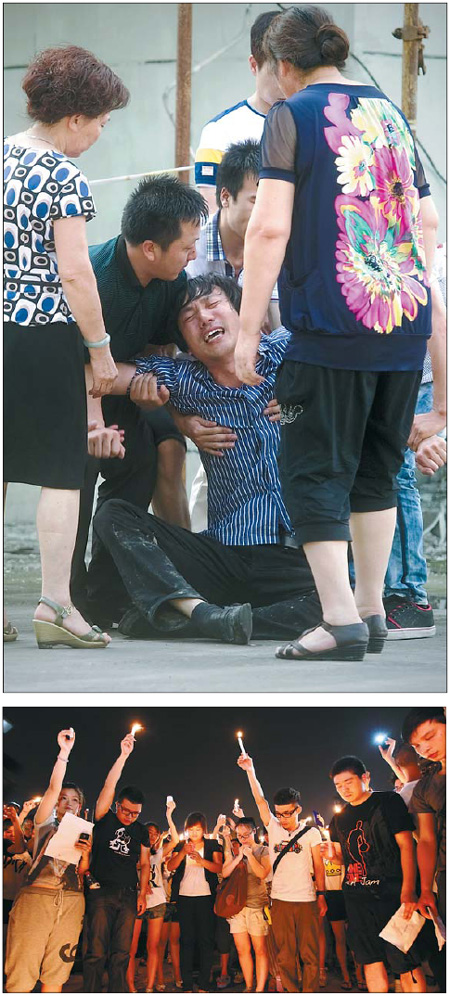Unanswered questions over rail dispatch system
|
Top: Chen Shengqiao, who lost his 12-year-old daughter Chen Yijie in the train accident, is helped by relatives as he cries after identifying her body at the city's crematorium in the town of Shuangyu in Wenzhou, Zhejiang province, on Monday. Bottom: Citizens in Wenzhou, Zhejiang province, mourn victims of the high-speed train collision on Monday night. Photos by Philippe Lopez / AFP and Gao Erqiang / China Daily |
Experts wonder how warning was not sent to other train on tracks
BEIJING - Insiders have questioned why the rail dispatch system failed to prevent the rear-end collision between two bullet trains on Saturday in Wenzhou.
The first bullet train was traveling south from the Zhejiang provincial capital of Hangzhou on Saturday evening when it lost power, allegedly due to a lightning strike, and stalled. The second train then hit it from behind.
Six carriages derailed and four fell about 15 meters from a viaduct.
The Ministry of Railways has not explained yet why the second train was apparently not warned there was a stalled train in its path. An investigation into the cause is under way, said ministry spokesman Wang Yongping.
According to Shuai Bin, a professor at Southwest Jiaotong University, and other experts, rear-end collisions of bullet trains are rare because a bullet train has at least two ways to inform the dispatch center of its operation and position.
Yang Jixiang, a rail signaling expert with China Railway Fourth Survey and Design Institute Group, told Beijing News that bullet trains all have radio signaling systems to keep in touch with the dispatch center, which is usually set up in every railway bureau.
In the case of the deadly accident on Saturday, the Shanghai railway bureau has such a dispatch center giving orders to trains running in Zhejiang, including the two trains that collided.
Yang said even if a radio signaling system is damaged by a lightning strike, the low-voltage rail should be able to detect a train on top.
Such a rail circuit signaling system can send the information to the dispatch center's computer system, and it is considered very reliable, he said.
The computer system will automatically issue a warning whenever a train malfunctions or two trains get too close, a veteran train driver with more than 20 years' working experience was quoted as saying by Beijing News.
With such a system, a rear-end collision is almost impossible unless the computer system breaks down or is sabotaged, or orders fail to reach trains in time, he said.
Professor Shuai also said he believes Saturday's accident might have happened because of a failure in dispatch management.
China Daily
(China Daily 07/26/2011 page3)



















